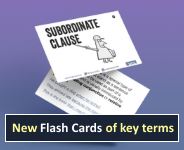Topic: Standards and variation
These resources take an exploratory approach to the nature of English in use, in real-world contexts.
Englicious contains many resources for English language in schools, but the vast majority of them require you to register and log in first. For more information, see What is Englicious?

